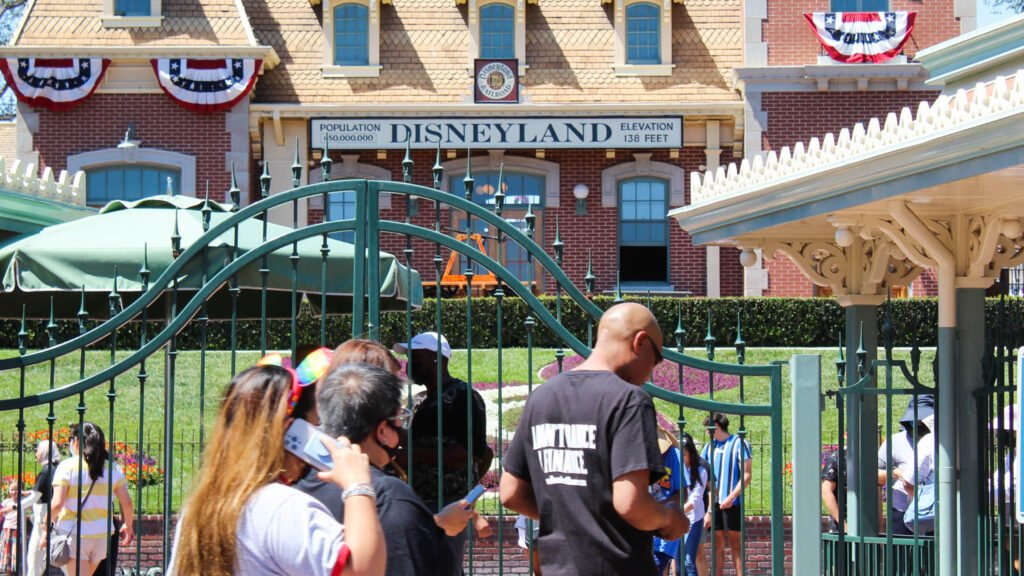Anaheim Might Ask Voters to Consider a Disneyland Gate Tax
In a city where Disney reigns supreme, the idea of taxing the gates of the Mouse House is akin to throwing a stone into a placid pond. The ripples might be felt for years. Yet, the specter of a looming $64 million budget deficit has compelled Anaheim officials to reconsider a topic relegated to whispers behind closed doors. Councilwoman Natalie Rubalcava’s recent call for an entertainment tax signals a seismic shift in a council long perceived as favoring corporate interests over municipal revenue.
The Roots of Resistance
For years, the notion of a gate tax—a levy imposed on tickets sold to large entertainment venues—was shunned by Anaheim’s council members, many of whom received financial backing from Disney and other local resort businesses. Rubalcava’s proposal nevertheless raises pressing questions regarding the intersection of governance and profit, particularly amid residual tensions following the recent city hall corruption scandal linked to former Mayor Harry Sidhu.
In the wake of the scandal, which exposed a disturbing level of influence wielded by Disney over city policymaking, Rubalcava’s suggestion represents a crucial pivot. As she succinctly put it during the city council meeting, “We are growing, but our budget is not growing, unfortunately. And we cannot continue to just depend on TOT (transient occupancy tax).” This emerging narrative of financial necessity juxtaposed against corporate interests presents a compelling case for deeper examination.
Revolutionary Perspectives
Political theorist Dr. Emily Carter, a researcher at the University of California, Irvine, notes, “The dynamics in Anaheim reflect a broader trend in U.S. cities where tourism-heavy economies are now grappling with the long-term sustainability of their financial models. This is not just about Disneyland; it’s about the very essence of public fiscal health.”
- Council members have traditionally prioritized corporate interests over local funding.
- Anaheim’s city budget has faced record deficits, compelling new discussions.
- Recent legal battles highlight the consequences of complacent governance tied to corporate allies.
The proposal for a gate tax, originally floated by former Councilman Jose Moreno in 2022, faced swift rejection from the Disney-aligned majority. Moreno’s pitch suggested that a modest 2% levy could generate between $55 million and $82 million annually, enriching the city’s coffers amidst a pandemic-driven budget crisis.
The Scandal that Changed Everything
The backdrop of Anaheim’s current fiscal dilemmas includes the fallouts from a scandal that rocked its political landscape—a failed sale of Angel Stadium revealing the extent of corruption and collusion with local businesses. As uncovered by federal investigations, Sidhu sought to push through a deal that would reward Disney with favorable terms, expecting significant campaign contributions in return.
Rubalcava’s move can be perceived as a deliberate response to this betrayal of public trust. Former Mayor Sidhu was sentenced to prison earlier this year for his corruption offenses, leaving the city grappling with the consequences of misplaced loyalty.
Breaking New Ground
The onus now lies in the hands of current city officials, five of whom have deep ties to Disney. Rubalcava insists that any financial burden must not fall on Anaheim residents. “We need to explore new sources of revenue through an entertainment tax,” she proposed, signaling her intent to pursue a balanced approach to taxation—one that burdens visitors, not locals.
Councilwoman Natalie Meeks was more circumspect, expressing reservations about a gate tax in light of the city’s financial dependency on tourism. “Our finance director has said we are a one-trick pony here in visitor revenue,” she cautioned, highlighting the need for diversifying revenue streams while suggesting the city explore the impending availability of funds from the paid-off 1997 Disneyland bonds.
What Lies Ahead
As discussions heat up, all eyes will be on the council meeting scheduled for September 23, where city staff will present preliminary analyses of the entertainment tax proposal. The aim is to get the issue onto the ballot for the November 2026 election, effectively giving Anaheim residents a stake in future fiscal stability.
“It’s time for the residents to weigh in on this really important ballot initiative,” Rubalcava remarked, emphasizing her commitment to ensuring a democratic process in managing public resources.
While the council’s recent history suggests a challenging road ahead, observers believe this could be an inflection point for Anaheim. If Rubalcava and her supporters succeed in framing the conversation around taxpayer fairness and sustainable revenue generation, the city might find itself at the vanguard of a movement looking to redefine the relationship between major corporations and local governance.
As the dialogue unfolds, the very fabric of Anaheim’s political landscape is at stake, challenging long-held views about financial priorities in a city built upon the backs of tourists. The fate of the gate tax will not only impact the city’s budget but also serve as a referendum on the future of corporate influence in local governance.





